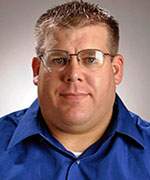116 3rd St SE
Cedar Rapids, Iowa 52401
Home / Sports / Iowa High School Sports
Coaches react to new Iowa high school baseball pitch-count limitations
 K.J. Pilcher
K.J. Pilcher May. 28, 2017 6:03 pm, Updated: Jun. 2, 2017 12:30 am
With growing concern for the well-being of young pitchers and the health of their arms, a change was made to limit the toll varsity competition takes on them.
The National Federation of High School Associations placed the responsibility in the hands of each state to determine the new guidelines and enact them for the 2017 season.
The Iowa High School Athletic Association consulted with multiple committees and shifted the focus from innings pitched to actual pitches thrown. Overall, the verdict still is out, but early reactions seem favorable to the new pitching restrictions.
'I think it's the best thing the state could have done,' Cedar Rapids Prairie Coach Todd Rima said. 'It protects kids and it gives us all a guide of what's right for every kid. The last thing us coaches want is for someone to be injured.'
The new pitch-count rules are both thorough and confusing. Pitchers cannot throw more than 110 pitches per day, unless it comes during an at-bat which the pitcher is allowed to finish. Sophomores, juniors and seniors can throw a maximum of 180 pitches per week (Sunday through Saturday). Freshmen and eighth-grade players are limited to 150 pitches per week.
If a pitcher throws 25 pitches or less, they are not required to rest for one day. Twenty-six to 40 pitches requires one day of rest. Two days rest is set for 41-65 pitches, while 66-90 pitches results in three days off the mound. If a pitcher throws more than 90, he will be shelved for four days.
Another nuance to the rule is if a player throws 25 pitches in the opener of a doubleheader, he is not allowed to pitch in the nightcap.
'You have to be careful your Monday guy doesn't get 91 pitches to be able to bring him back on a Friday,' Cedar Rapids Kennedy Coach Bret Hoyer said. 'It's going to have a significant impact. I think in a good way, too. I think it's been a long time coming and we need to start protecting these kids' arms.'
For some, the new rules support the practices they already had in place. Now, they just have to jump through official hoops to record counts, including them within 24 hours on Quikstats.
'We've always gone by the rule where it's one pitch for every hour (of rest),' said Dyersville Beckman assistant coach Conner Klostermann, who will be in charge of reporting pitch counts for the Blazers. 'So, if you need 24 hours rest it should have been about 24 pitches. Now, it's a state rule so there are some other regulations you need to abide by and I think it shouldn't be a problem with our coaching staff. We're pretty deep in pitching this year.'
The new procedures that accompany the rules saddle coaches with more in-game and postgame duties. Unless there are staff members or volunteers to help, coaches have more tasks to manage.
'I understand the thought process behind the pitch-count rule,' North Linn Coach Travis Griffith said. 'It's just that I don't think people understand how much that puts on coaches.'
Common sense still remains the best way to handle the workloads of young players — a problem that stems all the way to youth leagues. The rule is applied equally to each player, but there are variables that could make a difference to the individual. North Linn's Jake Hilmer threw 11 pitches in the first eight innings of a 2-1 14-inning win against Calamus-Wheatland. Griffith said 55 percent were change-ups, which puts less stress on a pitcher that threw the same amount with a majority of curveballs.
'Every kid is different,' Griffith said. 'I'm not a big fan of the rule. I get why they're doing it with all the arm injuries but I think there should be some trust in coaches that they know what's best for those kids and the kids know what's best for themselves, too. There's always those riding that one arm all the way through and that's what they're trying to avoid.'
Coaches have to find adult volunteers or adult staff to tally pitch counts every inning and then compare them with the other team. Griffith was lucky enough to expand his coaching staff so an assistant is in charge with verifying totals with the opponent.
Kennedy and Cedar Rapids Xavier have parent representatives that handle in-game pitch-count duties. Prairie assistant Kerry Mann is in charge of the Hawks' count. Cedar Rapids Jefferson has a volunteer statistician that handles it.
Filling those roles are easier when you have a large roster, more parents and even additional fans. It can be a challenge for small schools.
'If it would have been last year, we would have had two coaches,' Griffith said. 'That's a problem because neither of us want to be doing that during a game, having to go over and meet and have the right pitch count for each pitcher.
'Now, you're relying on a parent. Who knows if that parent is going to be at every game?'
If the assigned adults have a discrepancy, the home-team stats will be official. Coaches sign off on the totals after the game. When asked by The Gazette, Metro coaches did not report any major conflicts in numbers during the Bob Vrbicek Metro baseball tournament last week.
'I think the tough part will be the managing of it,' Rima said. 'There's going to be some bumps in the road. Any time there is something new and there is change there is going to be a struggle.'
Some teams play up to 30 games in June, which is more than Major League Baseball teams play.
Small schools will face the biggest challenge. Deeper rosters and a deeper talent pool will benefit big-school programs. Dyersville Beckman Coach Fred Martin said some schools may have to use pitchers that haven't thrown off a mound before this year. The positive is coaches will be forced to develop more pitchers. North Linn, a state qualifier two years ago, is the exception with plenty of arms.
'We saw some good things from some (junior varsity) kids this week already,' said Griffith, whose Lynx were 5-0 through Thursday. 'Kids we probably wouldn't have thrown a whole lot otherwise, but a couple surprised us and that's a good thing that comes from the rule.'
Strategy could be affected by the rule. When to use a pitcher, when you pull a pitcher and what you tell a batter when the pitch count of the opposing pitcher is climbing.
Some coaches used to use a Monday-Friday-Wednesday rotation that may be hindered with the new rules. Relievers may not be able to work consecutive days.
'The issue is if someone is throwing on a Monday against Kennedy and it's a 2-1 game,' Iowa City West Coach Charlie Stumpff said. 'You're leading and going into the seventh inning and he's had about 85 pitches. He can't come back Friday. That will be a little tricky.
'I would assume some of the relief would be a little different because you have to have more rest. We would throw guys in relief on Monday and Tuesday. There will be some difference. You've got to have a lot more depth.'
Martin added, 'You're going to watch guys shut kids down a little earlier in a game, if it looks like they're not going to win the game. That's already crossed my mind. If you're facing a guy who is super tough and your guy doesn't look like he's going to do it you're going to pull him out. There are times we have three doubleheaders in four or five days.'
Programs may have to change how they schedule games. If you don't have enough arms to cover innings due to the pitch-count limitations, you may need to cut down the amount of games on the calendar.
'I've got to believe small schools will be really tough, because they're eventually going to have to change their schedule,' said Stumpff, who previously coach Northeast Hamilton. 'You can only schedule for what you have pitching. It's got to be hard for a smaller school.'
Coaches could deliberately attempt to increase an opposition's pitch count by taking more pitches. The attempt could chase dominant pitchers from the game earlier than expected. Stumpff said it wouldn't be something his team would do on purpose.
'We're one of the most patient teams in America. We do good work,' Stumpff said with a laugh. 'Our approach should get guys' pitch counts up. We'd love to see the (Cedar Rapids Jefferson all-staters Spencer and Conner) Van Scoyocs of the world to get up there way early and get somebody else in, please, because they are too hard to hit.
'Some of that will change. I would hope we would not do that. We're just going to play the game and hopefully that approach is good enough.'
l Comments: (319) 368-8679; kj.pilcher@thegazette.com
Cedar Rapids Kennedy pitcher Anthony Alepra (27) delivers to the plate during the fourth inning of their game in the 2017 Bob Vrbicek Metro Baseball Tournament at Cedar Rapids Prairie High School in Cedar Rapids on Monday, May. 22, 2017. (Stephen Mally/The Gazette)
Cedar Rapids Prairie pitcher Darren Kilpatrick (21) goes through his windup as he delivers during the fourth inning of their game in the 2017 Bob Vrbicek Metro Baseball Tournament at Cedar Rapids Prairie High School in Cedar Rapids on Monday, May. 22, 2017. (Stephen Mally/The Gazette)
Cedar Rapids Prairie assistant coach Kerry Mann uses a counter and a clipboard to count pitches during their game in the 2017 Bob Vrbicek Metro Baseball Tournament at Cedar Rapids Prairie High School in Cedar Rapids on Monday, May. 22, 2017. (Stephen Mally/The Gazette)
Cedar Rapids Prairie assistant coach Kerry Mann uses a counter and a clipboard to count pitches during their game in the 2017 Bob Vrbicek Metro Baseball Tournament at Cedar Rapids Prairie High School in Cedar Rapids on Monday, May. 22, 2017. (Stephen Mally/The Gazette)





 Daily Newsletters
Daily Newsletters